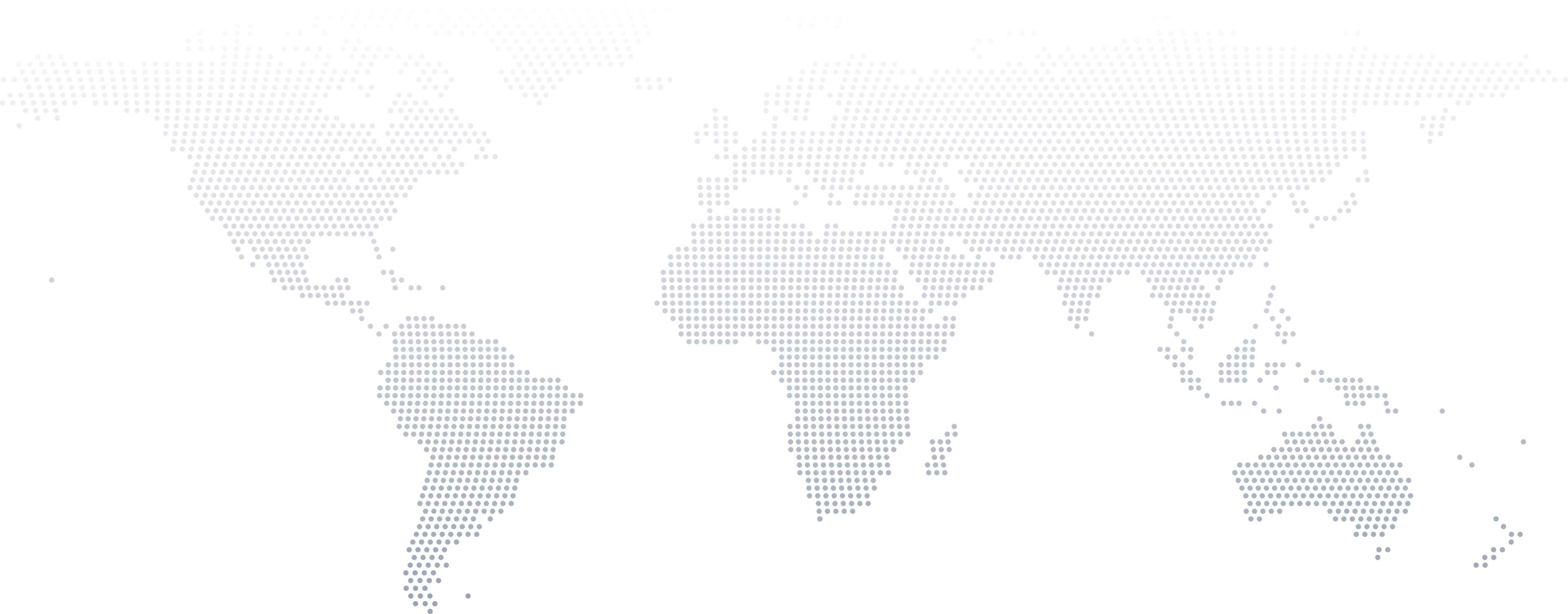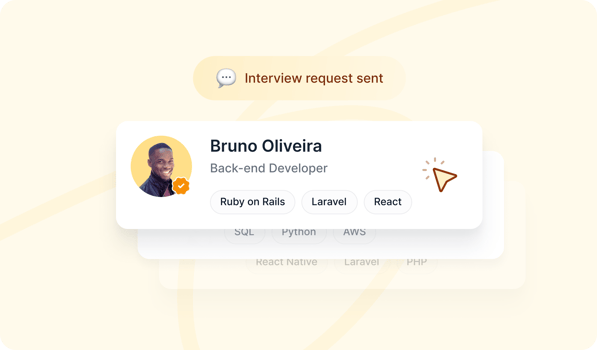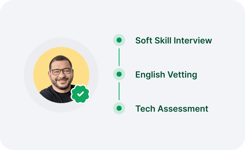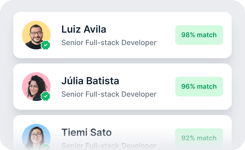Hire Remote Game Developers in 2025
Game development is a dynamic and creative field that brings together technical skills and artistic vision. Game developers are skilled professionals who specialize in designing, coding, and creating interactive games for various platforms. Their expertise lies in programming languages, game engines, and software development, enabling them to bring virtual worlds to life.
Game developers play a crucial role in the gaming industry, collaborating with artists, designers, and other team members to develop engaging gameplay mechanics, realistic graphics, and immersive experiences. Their work extends beyond entertainment, with game development techniques being applied to industries such as education, healthcare, and training simulations.
In today's interconnected world, remote and freelance options have become increasingly popular to hire game developers. Hiring remote game developers offers flexibility, cost-effectiveness, and access to a global talent pool. Latin America, in particular, has emerged as a favorable region for remote game developers due to its proximity to the United States and similar time zones. This close time zone alignment enables real-time collaboration and communication between teams, reducing potential delays and enhancing productivity.
What to Look for When Hiring Game developers?
Technical Skills
When hiring game developers, there are several key technical skills to look for:
Programming Languages
Proficiency in programming languages such as C++, C#, Java, Python, or JavaScript is essential for game development. Each language has its strengths and is used in different game engines, platforms, or development environments.
Game Engines
Look for experience with popular game engines like Unity, Unreal Engine, or Godot. A strong understanding of these engines enables developers to create and optimize game mechanics, visuals, and performance.
3D Modeling and Animation
Game developers should have knowledge of 3D modeling software like Blender or Maya and animation tools to design characters, environments, and objects in the game.
Gameplay Mechanics
A solid grasp of game design principles and mechanics is crucial. Developers should know how to create engaging gameplay, implement controls, and balance difficulty levels.
Debugging
Game development often involves complex challenges and bugs. Seek candidates who can demonstrate their problem-solving skills and debugging expertise to resolve issues efficiently.
Platform Knowledge
Depending on your project, consider candidates with experience in specific platforms, such as mobile, console, PC, or virtual reality.
By assessing these technical skills in potential game developer candidates, you can ensure you're hiring individuals with the right expertise to bring your game ideas to life successfully.
Soft Skills
When hiring game developers, it's important to consider their soft skills and other related abilities that contribute to their effectiveness and success. Here are some key soft skills to look for:
Creativity and Innovation
Game development requires creative thinking and the ability to come up with innovative ideas for gameplay, storylines, and mechanics. Look for candidates who can demonstrate their ability to think outside the box and bring fresh ideas to the table.
Collaboration and Teamwork
Game development is often a collaborative process involving multiple team members. Strong communication and teamwork skills are vital for working effectively with artists, programmers, designers, and other stakeholders. Look for candidates who can effectively communicate their ideas, listen to feedback, and collaborate seamlessly with others.
Adaptability and Problem-Solving
The gaming industry is dynamic and constantly evolving. Game developers need to be adaptable and agile, as they may encounter unexpected challenges and changes throughout the development process. Look for candidates who can demonstrate their ability to think on their feet, adapt to new situations, and find creative solutions to problems.
Attention to Detail and Quality
Games require meticulous attention to detail to ensure a high-quality user experience. Look for candidates who have a keen eye for detail, take pride in their work, and strive for excellence in all aspects of game development.
Knowledge of Best Practices and Trends
The gaming industry is shaped by best practices, emerging trends, and user expectations. Look for candidates who stay updated with the latest developments in game design, user experience, and technology. They should be able to apply industry best practices and incorporate current trends into their work.
By considering these soft skills and additional attributes, you can find game developers who not only possess the technical expertise but also have the qualities necessary to excel in the dynamic and collaborative world of game development.
Top 5 Game Developer Interview Question
Sure! Here are the top 5 technical interview questions for game developers:
Can you explain the concept of game optimization and share your experience in optimizing game performance?
This question assesses the candidate's understanding of performance optimization techniques and their ability to improve game performance.
A good candidate should explain the importance of game optimization in delivering a smooth and immersive gaming experience. They should discuss techniques such as efficient memory management, asset compression, level of detail (LOD) systems, and algorithm optimization. They should also provide specific examples from their past projects where they successfully optimized game performance and improved frame rates or reduced loading times.
Tell us about your experience with game physics engines and how you have implemented realistic physics in games.
This question evaluates the candidate's knowledge of physics simulation and their ability to integrate physics engines into game development.
A strong candidate should highlight their familiarity with popular physics engines like Unity's PhysX or Unreal Engine's physics system. They should discuss how they have utilized physics simulations for realistic character movement, object interactions, or environmental effects in games. They should demonstrate their understanding of collision detection, rigid body dynamics, and constraints, and provide examples of how they have achieved convincing and accurate physics interactions in their previous game projects.
Describe your experience in developing multiplayer games and handling network synchronization challenges.
This question examines the candidate's expertise in multiplayer game development and their understanding of network synchronization.
A suitable candidate should discuss their knowledge of multiplayer game architectures, networking protocols, and synchronization techniques. They should explain how they have handled challenges such as latency, server-client communication, and managing networked game objects. They should also mention any experience they have with implementing client-side prediction, server reconciliation, or lag compensation to ensure a smooth and fair multiplayer experience.
Can you explain your approach to designing and implementing artificial intelligence (AI) systems in games?
This question assesses the candidate's understanding of AI techniques and their ability to create believable and engaging AI behaviors.
An ideal candidate should discuss their knowledge of AI algorithms and approaches such as finite state machines, behavior trees, or neural networks. They should explain how they have designed AI systems that provide challenging and intelligent opponents or non-player characters (NPCs). They should also mention any experience they have with implementing decision-making, pathfinding, or adaptive AI that can learn and respond to player actions.
Share your experience in integrating game analytics and how it has impacted game development decisions.
This question evaluates the candidate's familiarity with game analytics tools and their understanding of using data-driven insights to improve game design and player experience.
A strong candidate should discuss their experience with integrating analytics frameworks like Unity Analytics or Google Analytics into games. They should explain how they have utilized player data and metrics to make informed design decisions, balance gameplay mechanics, or identify areas for improvement. They should also emphasize the importance of data-driven iteration and the ability to interpret and act upon analytics findings to enhance player engagement and retention.
These interview questions are designed to assess a candidate's technical knowledge, problem-solving abilities, and practical experience in game development. A good candidate should provide clear and concise answers while showcasing their expertise, relevant experience, and ability to handle challenges in the game development process.









